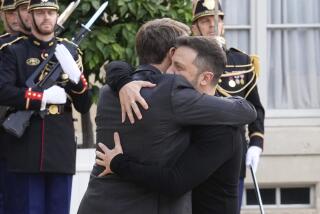Gorbachev Shadow Clouds Baker’s Tour
- Share via
ROME — As Secretary of State James A. Baker III dashes across Europe this week at a pace of three countries a day, he finds himself dogged at every step by an unseen--and unwelcome--presence: Soviet President Mikhail S. Gorbachev.
In London, Baker compared notes on Gorbachev’s program of perestroika, or restructuring, with British Prime Minister Margaret Thatcher. In Bonn, he wrestled with a West German government increasingly drawn toward Gorbachev’s vision of European disarmament. In Copenhagen, Oslo and Rome, he asked how NATO can regain the initiative in East-West affairs when Gorbachev appears to have seized the agenda.
“The world is going through a period and a process of change,” Baker told reporters on the Air Force plane that brought him here Tuesday after stopovers in Turkey and Greece. “One thing is very clear, and that is that the NATO alliance is key and fundamental to addressing those changes.”
In years past, such a statement would have been taken as self-evident. But today, with Gorbachev unilaterally reducing the size of the Soviet armed forces and tolerating new independence among the nations of Eastern Europe, Baker’s words about the 40-year-old Western alliance carried almost a defensive edge.
“My question is whether NATO will exist five years from now,” said Alexander Alexiev of Santa Monica’s RAND Corp. think tank. “Every good thing outlives its time. . . . If there’s no Soviet threat, what do we need NATO for?”
Alexiev and other scholars acknowledge that for now, the Soviet threat to Western Europe remains very real. But the increasing, quite palpable perception in Western Europe is that Gorbachev is genuinely reducing that threat--and that the usefulness of the North Atlantic Treaty Organization may be waning as well.
Already, public opinion polls in several Western European countries show Gorbachev to be one of the most popular, and even most trusted, world leaders.
Even more alarming to U.S. officials, polls in West Germany show a majority in favor of withdrawing nuclear weapons from the country, a move which would seriously disrupt NATO defense plans.
Gorbachev has captured Europe’s attention by announcing that he is unilaterally withdrawing six tank divisions from Eastern Europe, by reasserting the Kremlin’s drive for nuclear-free zones in Europe and by completing his promised withdrawal from Afghanistan.
Gorbachev Visits to Europe
The Soviet president is expected to press his openings to the West still further this year with visits to Britain, West Germany, France and Italy, as well as his trip to reopen ties with China in May.
“It is important that we deal with the public perception that Gorbachev is taking the initiative,” an official in London quoted British Foreign Secretary Geoffrey Howe as telling Baker earlier this week.
“One of the most striking things about Gorbachev is his admission of failure (in the Soviet system), and yet . . . the Western agenda has a hard time competing with Gorbachev’s own ability to attract attention,” said a senior U.S. official traveling with Baker.
“There is just an attraction, an intriguing quality to Gorbachev, and you have to answer somehow,” the official said. “But we have no answers.”
U.S. and other Western officials insist, a little plaintively, that NATO should be getting more credit for improved relations with the Soviet Union. “The agenda that’s being worked is the Western agenda,” the senior official said.
Still, a U.S. diplomat in Bonn acknowledged, “Gorbachev has the initiative. There’s no denying it.”
Baker and other allied leaders have been discussing several possible NATO initiatives to try to steal some of Gorbachev’s thunder:
-- An assertive joint position at upcoming talks on conventional armed forces, calling for a cut of 40,000 tanks in Europe, most of them Soviet.
-- A challenge to the Soviet Union to cooperate with the West on “transnational” issues such as terrorism and drugs; Baker may take this tack in his first meeting with Soviet Foreign Minister Eduard A. Shevardnadze on March 7 in Vienna.
But it may not be easy for NATO to seize the public relations high ground quickly, diplomats say.
The alliance is struggling to patch up a series of disputes between the United States and West Germany, including a disagreement over whether NATO should seek negotiations to reduce short-range nuclear missiles. Germany favors talks, the United States dislikes the idea.
In Ankara, Baker received some support for the U.S. position Tuesday from Turkish Prime Minister Turgut Ozal before going on to discuss U.S. bases with Greek Premier Andreas Panpandreou.
The Bush Administration’s formal review of U.S.-Soviet relations and arms control policy is still only getting under way, and the alliance cannot take any initiatives until Bush has decided what he wants.
More to Read
Sign up for Essential California
The most important California stories and recommendations in your inbox every morning.
You may occasionally receive promotional content from the Los Angeles Times.














